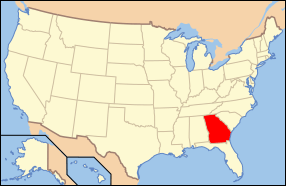Gun laws in Georgia
Gun laws in the state of Georgia regulate the sale, possession, and use of firearms and ammunition in the state of Georgia in the United States. It does not however affect the laws of other states. The Georgia Constitution, like many other state constitutions, guarantees to its citizen the right to keep and bear arms. Article one, section one, paragraph VII of the Georgia Constitution states: "The right of the People to keep and bear arms shall not be infringed, but the General Assembly shall have the power to prescribe the manner in which arms may be borne."

Overview
On June 8, 2010, Senate Bill 308 was signed by Governor Sonny Perdue reforming and clarifying many of Georgia's Gun Laws, while leaving certain restrictions in place.[1][2]
Georgia is a "shall issue" state, with the Georgia Weapons Carry License application to be submitted through the probate court of the county of residence. Applicants must be at least 21 years of age, unless they provide proof of basic training and service in the military.[3][4]
According to the Georgia Department of Law, "Georgia will recognize the weapons carry licenses, both resident and non-resident, from any other state provided that that state likewise recognizes a Georgia license."[5] The states recognized under reciprocity include: Alabama, Alaska, Arizona, Arkansas, Colorado, Florida, Idaho, Indiana, Iowa, Kansas, Kentucky, Louisiana, Maine, Michigan, Mississippi, Missouri, Montana, New Hampshire, North Carolina, North Dakota, Ohio, Oklahoma, Pennsylvania, South Carolina, South Dakota, Tennessee, Texas, Utah, Virginia, West Virginia, Wisconsin, and Wyoming.[6] A non-resident of Georgia to whom has been issued a firearm license by a state listed above may carry a firearm while in Georgia in accordance with Georgia law.[7] This includes non-residents under the age of 21.[8]
South Carolina H3799 was signed by Gov Haley on June 3, 2016, allowing reciprocity with Georgia CCW permits.
There are a number of ways a firearm can be carried without a permit.[1][9] No permit is needed:
- To carry a firearm in a person's home, place of business, or vehicle
- To carry a long gun in a fully open and exposed manner
- To carry an unloaded firearm in a case
- To carry a firearm in someone else's vehicle, provided you would qualify for a permit
- To carry a firearm while fishing or hunting, if you have a valid fishing or hunting license
State preemption laws prohibit localities from regulating the ownership, transportation, and possession of firearms. Georgia also has a law preventing localities from enacting ordinances or lawsuits to classify gun ranges as nuisances. This means that local parks, offices, etc. of non-Federal government agencies may not prohibit those with a valid Georgia Weapons License from carrying. Federal regulations continue to prohibit carrying weapons on Corps of Engineers and US Postal Service property.

Firearm regulations are uniform throughout the state, and a firearms permit is valid throughout the state, in all areas other than in a few specially-defined areas.[10] These specially-defined prohibited areas include:
- In a government building, where ingress into such building is restricted or screened by security personnel and overseen by a POST certified, sworn peace officer
- In a courthouse
- In a jail or prison
- In a place of worship, unless the governing body or authority of the place of worship permits the carrying of weapons or long guns by license holders
- In a state mental health facility
- On the premises of a nuclear power facility
- Within 150 feet (46 m) of any polling place, only during an election.[10][11]
- On school grounds (incl. building and grounds), unless carrying or picking up a student, or permitted in writing by an official of the school, however weapons may be securely stored in vehicles parked on school grounds.[12][13][14]
As exceptions to the above list, a person may keep their firearm in a locked compartment of their vehicle at any of the above places except nuclear power facilities. Also, a person may approach security or management of any of the above places (except schools and nuclear power facilities) and ask them for directions on removing, securing, storing, or temporarily surrendering the weapon.[2][10]
As of July 1, 2006, Georgia became a "Stand Your Ground" state, and requires no duty to retreat before using deadly force in self-defense, or defense of others.[15][16]
Georgia law allows private firearm sales between residents without requiring any processing through an FFL.
A Kennesaw, GA city ordinance requires that all homeowners own a firearm and ammunition (Sec 34-1a). No one has ever been charged with violating this ordinance. An amendment exempts those who conscientiously object to owning a firearm, convicted felons, those who cannot afford a firearm, and those with a mental or physical disability that would prevent them from owning a firearm.
As of the 23rd of April, 2014, Georgia's gun laws were revised when Governor Nathan Deal signed House Bill 60, or the Safe Carry Protection Act, into action.[17][18] The Safe Carry Protection Act changed many of the currently enacted gun laws in place beforehand.
In 2017, the Georgia legislature passed HB 280, which allows for concealed carry permit holders to carry concealed handguns on public college campuses. Governor Nathan Deal signed it into law on May 4, 2017.[19][20] The law took effect July 1, 2017 on all University System of Georgia Campuses, including universities, colleges, and trade schools under the University System. Under HB280 any Georgia Weapons Licensee may carry on University System of Georgia property if they are carrying concealed. They may not carry in any dormitory or Greek house owned by the University System, in any athletic venue used for intercollegiate sports, in any daycare facility on campus with limited entry (gated), in any classroom with a currently enrolled high school student, in any private office space, or in any room currently in use for disciplinary proceedings.[21] HB280 does not remove the prohibition against carry on private university and college property under Georgia Law.[22]
Some counties have adopted Second Amendment sanctuary resolutions.[23]
Summary table
| Subject/Law | Long guns | Handguns | Relevant Statutes | Notes |
|---|---|---|---|---|
| State permit required to purchase? | No | No | None | |
| Firearm registration? | No | No | None | |
| Assault weapon law? | No | No | None | |
| Magazine Capacity Restriction? | No | No | None | |
| Owner license required? | No | No | None | |
| Permit required for concealed carry? | Yes | Yes | O.C.G.A § 16-11-129 | Concealed or open carry allowed with permit. See also O.C.G.A § 43–38–10 which is a special permit for armed security guards. Concealed carry of long guns allowed without a license ONLY if unloaded. O.C.G.A § 16-11-126 (b) |
| Permit required for open carry? | No | Yes | O.C.G.A § 16-11-126 | Open carry of handguns allowed with a license issued under O.C.G.A § 16-11-129. Open carry of long guns allowed without a license. O.C.G.A § 16-11-126 (b) |
| State Preemption of local restrictions? | Yes | Yes | O.C.G.A § 16-11-173 | Despite state preemption, several localities continue to have local gun restrictions. Recent court rulings have resulted in many of these ordinances being withdrawn. |
| NFA weapons restricted? | No | No | None | |
| Peaceable Journey laws? | No | No | None | Federal rules observed. |
| Background checks required for private sales? | No | No | None |
References
- "Georgia Gun Laws" (PDF). Handgunlaw.us. Retrieved October 26, 2018.
- "Georgia Senate Bill 308" (PDF). Georgia General Assembly. Retrieved October 26, 2018.
- "O.C.G.A. § 16-11-129". web.lexisnexis.com. Retrieved 2015-08-24.
- "GA Code § 16-11-129 (2017)". Justia Law. Retrieved 2018-10-26.
- Dobras, Rebecca J., Assistant Attorney General of Georgia (July 11, 2018). "Re: Concealed Weapons License Reciprocity with the State of North Carolina" (PDF). Letter to Marie H. Evitt, Assistant Attorney General of North Carolina. Retrieved October 26, 2018.
- NRA-ILA. "NRA-ILA | Georgia: Pro-Gun Reciprocity Legislation Signed Into Law". NRA-ILA. Retrieved 2017-04-06.
- "Georgia's Firearm Permit Reciprocity | Georgia Department of Public Safety". dps.georgia.gov. Retrieved 2015-08-24.
- Dobras, Rebecca J., Assistant Attorney General of Georgia (May 2, 2017). "RE: Utah Request for Concealed Permit Info" (PDF). Letter to Ryan Van Fleet, Deputy Director of Utah Department of Public Safety. Retrieved October 26, 2018.
- "GA Code § 16-11-126 (2017)". Justia Law. Retrieved 2018-10-26.
- "GA Code § 16-11-127 (2017)". Justia Law. Retrieved 2018-10-26.
- "Georgia House Bill 492" (PDF). Georgia General Assembly. Retrieved October 26, 2018.
- "O.C.G.A. § 16-11-130.1". web.lexisnexis.com. Retrieved 2015-08-24.
- "GA Code § 16-11-130.1 (2017)". Justia Law. Retrieved 2018-10-26.
- "GA Code § 16-11-127.1 (2017)". Justia Law. Retrieved 2018-10-26.
- "Georgia Senate Bill 396" (PDF). Georgia General Assembly. Retrieved October 26, 2018.
- "GA Code § 16-3-23.1 (2017)". Justia Law. Retrieved 2018-10-26.
- "Georgia House Bill 60" (PDF). Georgia General Assembly. Retrieved October 26, 2018.
- "Georgia's 'guns everywhere' law stirs controversy among students, teachers". USA TODAY. Retrieved 2018-10-26.
- "Georgia House Bill 280" (PDF). Georgia General Assembly. Retrieved October 26, 2018.
- NRA-ILA. "NRA-ILA | Georgia: Governor Deal Signs Campus Carry Legislation into Law". NRA-ILA. Retrieved 2017-05-05.
- Wrigley, Steve, Chancellor of the University System of Georgia (May 24, 2017). "RE: House Bill 280" (PDF). Letter to The University System of Georgia Community. Retrieved October 26, 2018.
- "How does Georgia's campus carry bill work?". AJC. Retrieved 2018-10-26.
- "Habersham becomes first Second Amendment Sanctuary County in Georgia". AccessWDUN. Retrieved 2020-01-18.